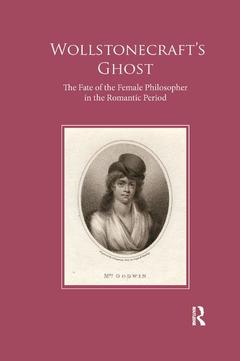Description
Wollstonecraft's Ghost
The Fate of the Female Philosopher in the Romantic Period
Author: McInnes Andrew
Language: English
Subjects for Wollstonecraft's Ghost:
Keywords
Lady Delacour; Female Philosopher; female; Silver Fork Fiction; philosopher; Bridgetina Botherim; wollstonecrafts; Wollstonecraft's Life; life; Silver Fork; lady; Harriet Freke; delacour; Mary Wollstonecraft; silver; Perkin Warbeck; fork; Godwin's Memoirs; bridgetina; Dacre's Zofloya; botherim; Hindoo Rajah; Wollstonecraft’s Death; Mansfield Park; Civic Responsiveness; Female Gothic; Thornfield Hall; Female Quixote; Bertha Mason; Silver Fork Novel; Elizabeth Lavenza; Domestic Affections; Godwin's Publication; Godwin's Political Justice; FEMALE DIFFICULTIES
Publication date: 12-2019
· 15.6x23.4 cm · Paperback
Publication date: 08-2016
· 15.6x23.4 cm · Hardback
Description
/li>Contents
/li>Readership
/li>Biography
/li>
Focusing on the ways in which women writers from across the political spectrum engage with and adapt Wollstonecraft's political philosophy in order to advocate feminist reform, Andrew McInnes explores the aftermath of Wollstonecraft's death, the controversial publication of William Godwin's memoir of his wife, and Wollstonecraft's reception in the early nineteenth century. McInnes positions Wollstonecraft within the context of the eighteenth-century female philosopher figure as a literary archetype used in plays, poetry, polemic and especially novels, to represent the thinking woman and address anxieties about political, religious, and sexual heterodoxy. He provides detailed analyses of the ways in which women writers such as Mary Hays, Elizabeth Hamilton, Amelia Opie, and Maria Edgeworth negotiate Wollstonecraft's reputation as personal, political, and sexual pariah to reformulate her radical politics for a post-revolutionary Britain in urgent need of reform. Frances Burney's The Wanderer and Jane Austen's Mansfield Park, McInnes suggests, work as state-of-the-nation novels, drawing on Wollstonecraft's ideas to explore a changing England. McInnes concludes with an examination of Mary Shelley's engagement with her mother throughout her career as a novelist, arguing that Shelley gradually overcomes her anxiety over her mother's stature to address Wollstonecraft's ideas with increasing confidence.
Contents
Acknowledgements
Introduction: I’m Not a Female Philosopher, But…
Chapter 1. Imagining Mary: Representations of Wollstonecraft in the Works of Mary Hays and William Godwin
Chapter 2. The Death of the Feminist in Amelia Opie’s Adeline Mowbray, Elizabeth Hamilton’s Modern Philosophers and Maria Edgeworth’s Belinda
Chapter 3. England in Eighteen Hundred and Fourteen: The State of the Nation in Frances Burney’s The Wanderer and Jane Austen’s Mansfield Park
Chapter 4. Hideous Progeny: The Female Philosopher in Gothic, Historical and Silver Fork Fiction
Afterword: The Afterlives of the Female Philosopher
Bibliography
Andrew McInnes is Senior Lecturer in English Literature at Edge Hill University, UK.
These books may interest you

Mary Wollstonecraft 359.92 €

Mary Wollstonecraft in Context 120.25 €

The Wollstonecraftian Mind 250.90 €

